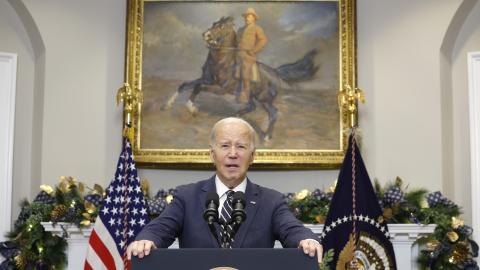As Congress wrestles with another supplemental funding request for Ukraine, it’s worth assessing why Kyiv deserves our continued support. America is facing mounting deficits and debts, and President Biden’s request for more than $60 billion is more than twice the US Coast Guard’s annual budget. We should not allow the sticker shock to deter us, however. Support for Ukraine remains a bargain for American national security.
For about 5% of total US defense spending over the past 20 months, Ukraine has badly degraded Russia, one of the United States’ top adversaries, without shedding a single drop of American blood.
Ukraine has inflicted an estimated 300,000 casualties on the Russian military and destroyed or damaged huge amounts of expensive Russian armor, fixed- and rotary-wing aircraft and surface combatants and submarines, even forcing part of Russia’s famed Black Sea Fleet to relocate from Sevastopol to Novorossiysk. Although Russia can conscript more soldiers and build more weapons, it takes years to train and grow an effective fighting force. And Ukraine isn’t done yet — when Russia takes the offensive next year, Moscow’s losses will grow rapidly again.
US spending on the war in Ukraine is also revitalizing the US defense-industrial base, which has atrophied since the Cold War’s end. As Sen. Mitch McConnell has pointed out, the overwhelming majority of funds Congress has approved for Ukraine have gone directly to American manufacturers, totaling some $70 billion across 38 states. As obsolete US weapons are shipped to Ukraine, they’re replaced by modern systems made in the USA. Our allies are buying American, too.
Paradoxically, the Ukraine supplemental is an upfront investment that will actually reduce the costs of supporting Ukraine over time. That’s because Ukraine’s success on the battlefield today places a smaller economic burden on the West tomorrow. As they’ve donated their weapons to Ukraine, Europeans have placed big orders with US suppliers to refill their arsenals or upgrade their capabilities — to the tune of $90 billion to date.
Russian forces are deterring international investors from participating in Ukraine’s recovery and attacking its global commercial shipping, an essential part of the country’s commodity-heavy export economy. Through its occupation of Crimea, Russia is raising doubts about the future of Ukraine’s major city of Odesa as a free and open port.
If Ukraine is defeated, it will turn into a landlocked economic basket case wholly dependent on Western aid for survival. If it wins, the West will gain a large, resource-rich ally with access to the Black Sea and an impressive reservoir of human talent. This supplemental will play a large role in deciding which scenario comes to pass. Defending US interests is worth the investment.
Ukrainians are holding the line against Russian President Vladimir Putin as he wages a broader assault on the US-built international order. In December 2021, Putin demanded in a draft treaty that NATO withdraw from Central and Eastern Europe. This year, Dmitry Medvedev, Russia’s former president and prime minister who serves as the Russian Security Council deputy chairman, referred to the nations of Eastern Europe as “our Baltic provinces” and “temporarily occupied Poland.”
Ukraine’s collapse would hasten the day when a US president may have to decide between defending the Baltic states or presiding over the disintegration of NATO, whose European members hold two-thirds of the total foreign direct-investment stock in the United States. In that context, $60 billion is a relatively modest investment. It’s an investment that will allow Ukraine to continue eroding Russia’s ability to project power further afield, too.
During the battle of Bakhmut, Ukrainian forces inflicted enormous losses on the Wagner Group, the mercenary outfit the late Yevgeny Prigozhin founded. Wagner is one of the principal vehicles through which Russia insinuates itself across Africa and the Middle East, from Syria to Libya, from the Central African Republic to Niger. Not only has Kyiv punctured Wagner’s aura of invincibility in these countries, but Ukrainian special forces supported by American taxpayers are actively targeting Wagner units in Sudan.
Passing the supplemental will help Ukraine limit Russian power abroad in other ways as well. On its western and southern flanks, Russia has built three anti-access, area-denial zones from which it projects power: Kaliningrad on the Baltic Sea, the Crimean Peninsula in the Black Sea and, in Syria, Latakia and Tartus on the Mediterranean Sea. Having control of Crimea, which Putin seized in 2014, facilitated Russia’s operations in Syria in support of Bashar al-Assad and his interventions in the Libyan civil war. Both weakened America’s position in the Middle East and North Africa. Ukraine is determined to liberate Crimea, a dagger aimed at US interests in the Near East. The aid under consideration would increase Ukraine’s ability to threaten Russia in Crimea, which would have a positive effect in the Black Sea and Mediterranean regions.
Congress should pass the Ukraine supplemental and support Kyiv for as long as it wishes to fight. Yes, $60 billion is a lot of money, but it pales in comparison to the costs of letting Ukraine fail.















